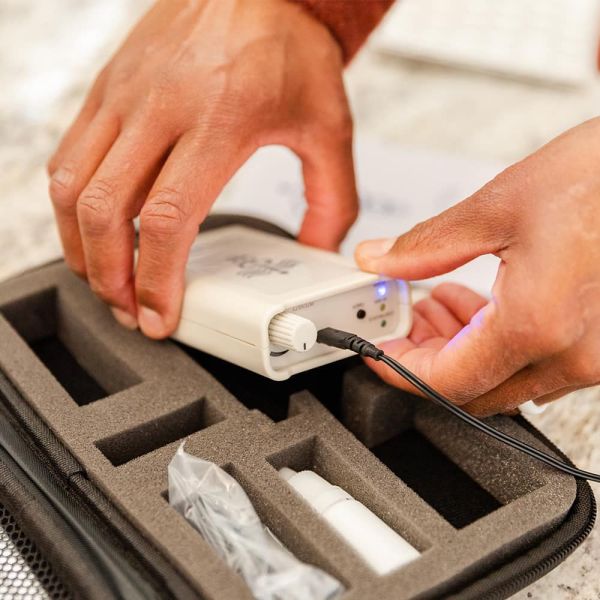Cranial Electrotherapy Stimulation (CES) devices have gained recognition as a promising non-invasive treatment for conditions like anxiety, insomnia, depression, and Seasonal Affective Disorder (SAD).
As with any medical device, potential users may wonder: Are cranial electrotherapy devices safe?
In this blog, we’ll explore the safety of CES devices, discuss how they work, and highlight why the CES Ultra is one of the safest and most effective options on the market today.
What is Cranial Electrotherapy Stimulation (CES)?
CES is a form of neuromodulation that uses low-level currents in an electrical stimulator of the brain to regulate the production of neurotransmitters such as:
- Serotonin
- Dopamine
- Melatonin
These chemicals are crucial in managing mood, sleep, and anxiety.
CES devices are designed to be user-friendly, portable, and easy to use at home. They involve placing electrodes on the earlobes or scalp, through which the electrical currents are delivered.
CES therapy is FDA-cleared to treat anxiety and insomnia. Research has shown that it can also be effective for conditions like SAD and vagus nerve stimulation.
For more information on how CES therapy works, visit our detailed guide on CES devices for anxiety relief.

How Safe Are Cranial Electrotherapy Devices?
When considering whether cranial electrotherapy devices are safe, it’s important to note that CES therapy has undergone extensive testing and research, particularly with devices like the CES Ultra.
Here’s why CES devices are considered safe:
FDA-Cleared for Safety
CES devices, including CES Ultra, have been cleared by the Food and Drug Administration (FDA), ensuring that they meet strict safety and efficacy standards. The FDA does not approve CES devices as a treatment for every condition but clears them based on rigorous testing for specific disorders such as anxiety and depression.
Minimal Side Effects
CES devices are associated with very few and generally mild side effects. Commonly reported side effects include:
- Slight headaches
- Skin irritation where electrodes are applied
- Dizziness during or after a session
These side effects are usually temporary and resolve quickly once the device is no longer in use.
In comparison to medications prescribed for depression and anxiety, which may cause side effects like nausea, weight gain, or sleep disturbances, CES therapy provides a much safer and more natural approach.
Non-Invasive and Drug-Free
CES therapy is non-invasive, meaning that no surgery or physical intrusion is involved. Unlike antidepressants or sleep medications, CES technologies do not carry the risk of chemical dependency or significant physiological side effects.
It works by balancing neurotransmitters naturally through gentle electrical stimulation, making it a safe, drug-free alternative for those looking for a more holistic treatment option.
For more information on how CES therapy can help with anxiety without medication, check out our detailed page here.
Can Be Used at Home
Many treatments for mental health conditions require regular visits to healthcare professionals. However, CES devices like the CES Ultra are designed for use at home, under the guidance of a healthcare provider.
This convenience not only makes CES therapy more accessible but also enhances safety, as users can adjust the treatment according to their comfort levels while being able to pause the session if any discomfort arises.
No Long-Term Risks
Long-term studies of CES devices have not demonstrated any significant risks or damage resulting from prolonged use. On the contrary, CES therapy has shown sustained benefits for managing conditions such as:
- Insomnia
- Anxiety
- Depression
This makes CES a reliable option for individuals seeking long-term relief from their symptoms.
To learn more about how CES devices can improve sleep, check out our guide on CES devices for insomnia.
Who Should Use CES Devices?
While CES therapy is considered safe for most people, certain individuals should consult their healthcare provider before starting treatment.
This includes:
- Pregnant Women: There is limited research on the effects of CES during pregnancy, so it is recommended to consult with a doctor.
- Individuals with Implanted Electrical Devices (e.g., Pacemakers): As CES devices deliver electrical impulses, individuals with certain medical implants should consult a healthcare professional before using CES therapy.
- People with Severe Neurological Conditions: Individuals with epilepsy or other severe neurological disorders should discuss the use of CES therapy with their healthcare provider.
CES therapy is widely accessible, safe, and non-invasive, making it suitable for the majority of users looking for natural treatments for conditions like anxiety, depression, and insomnia.

Why CES Ultra is the Best Choice for Safe Treatment
When it comes to safe and effective treatment, the CES Ultra stands out as one of the top devices in the market. Here’s why CES Ultra should be your go-to choice for CES therapy:
-
Clinically Proven
CES Ultra has been extensively studied and proven effective for treating anxiety, depression, and insomnia. Its clinical backing ensures that users receive a treatment that has been validated for safety and efficacy.
-
User-Friendly Design
CES Ultra is designed with ease of use in mind. The device comes with clear instructions, adjustable settings, and a simple interface, making it perfect for use at home. It also includes electrodes that are comfortable and non-irritating, minimizing any discomfort during sessions.
-
Portable and Convenient
Whether you’re at home or traveling, CES Ultra is lightweight and portable, allowing you to continue your treatment wherever you are. It’s a convenient option for managing your mental health on your schedule.
-
FDA-Cleared
As mentioned earlier, CES Ultra is FDA-cleared for the treatment of anxiety and insomnia. This clearance ensures that the device meets strict standards for safety and effectiveness, giving users peace of mind.
For more information about CES Ultra and to explore its benefits, visit the CES Ultra product page.
Are Cranial Electrotherapy Devices Safe?
In conclusion, cranial electrotherapy devices like the CES Ultra are safe, non-invasive, and effective for treating a range of conditions, including anxiety, insomnia, and depression.
Backed by clinical studies and cleared by the FDA, CES therapy offers a natural alternative to medications, with minimal side effects and no long-term risks.
Whether you’re seeking relief from anxiety, better sleep, or improved mood, CES Ultra is a reliable option that delivers real results.
If you’re ready to experience the benefits of CES therapy, click here to get started with CES Ultra today.

